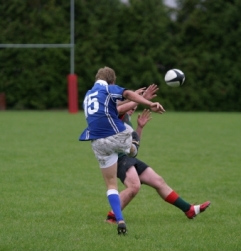The King-Devick Test, a simple two-minute test of rapid eye movement, is an accurate "remove-from-play" sideline concussion assessment tool for youth rugby players, according to a new study by researchers in New Zealand.1
The rugby study, reported online in the Journal of Neurological Sciences, follows a 2011 study2 of collegiate athletes by researchers at the University of Pennsylvania reported in the same journal which also found that the K-D test provides an accurate and reliable method for quick assessment of concussion.
A visual recognition and reaction time test utilized for over 25 years to track rapid eye movements called saccades, and detect reading difficulties such as dylexia, the K-D test requires a test-taker to read from left to right eight rows of unevenly spaced, single digit numbers on three test cards as quickly and accurately as possible.
Originally developed in the 1980's by optometrists Al King and Steve Devick at the Illinois College of Optometry, the K-D test provides objective measures of many aspects of brain function, including subcortical (subconscious) pathways that extend beyond eye movements. It not only measures the speed of rapid number naming, thus capturing impairment of eye movements, but the test-taker's balance, attention, language and visual recognition skills and other correlates of suboptimal brain function.
The two-minute sideline test can be administered via an iPad app or with physical test-cards, players when they come off the field and can be applied to all contact sports including football, soccer, hockey, basketball, among others.
Study details
In the New Zealand study, researchers administered a concussion screening on each player of a specific team after every rugby match to focus on identifying un-witnessed concussions. The results showed that out of the 50 players in the season-long study, three exhibited signs of a concussion during the game and were confirmed to have a concussion with slower times on the King-Devick Test and via other sideline concussion asssement tools. Two other concussions were identified from slower King-Devick Test scores following the game, despite no noted head trauma identified during the match.
Players with a clinical diagnosis of concussion, performed on average more than five seconds slower (worse) than their King-Devick baseline score.
Useful in initial concussion assessment
"The King-Devick Test was not only useful in identifying changes in players with witnessed suspected concussion, but also in players with an un-witnessed concussion," said Doug King, PhD, corresponding author on the paper, but not related to the King who co-invented the K-D Test. "Using the K-D Test iPad platform enabled us to complete a quick and easy assessment of the players when they came off the field. The instant identification of a difference in scores makes the King-Devick Test ideal for side line assessment," King said.
Dr. King recalled, "Some of the results had us reaching for video footage of the matches so we could work out when they were concussed and why we missed seeing it. We still are unsure what occurred for one of the un-witnessed concussions that the King-Devick Test identified. What surprised me was how big the difference from his King-Devick baseline was, and when we did the SCAT2, how many symptoms he had. If we had not picked this concussion up by using the King-Devick Test, he would have played the following week. This was a scary thought, as they were young kids we were monitoring."
The New Zealand researchers concluded that, "the ease-of-use of the K-D test made it more acceptable to team management and players and, as it provided immediate feedback to the player and coach, the K-D test served to provide support for the decision made by the team medic to rule out the player from further match participation."
The test has shown such promise for sideline assessment of concussion that consumer advocate Ralph Nader is now calling for its mandatory use at all levels of sports, from the pros down to youth leagues.31. King D, Clark T, Gissanec C. Use of a rapid visual screening tool for the assessment of concussion in amateur rugby league: A pilot study. J. Neuro Sci . http://dx.doi.org/10.1016/j.jns.2012.05.049.
2. Galetta K, Brandes L, Maki K, Dziemiannowicz M, Laudano E., Allen M, Lawler K, Sennett B, Wiebe D, Devick S, Messner L, Galetta S, Balcer L. The King-Devick test and sports-related concussion: Study of a rapid visual screening tool in a collegiate cohort. J. Neuro Sci. 2011; 309(1):34-39.
3. "Ralph Nader Calls For Mandatory Implementation of King-Devick Concussion Test in High School and Youth Sports" (ttp://leagueoffans.org/2011/08/25/ralph-nader-calls-for-mandatory-implementation-of-king-devick-concussion-test-in-high-school-and-youth-sports/) (accessed August 25, 2011)
Posted June 15, 2012








